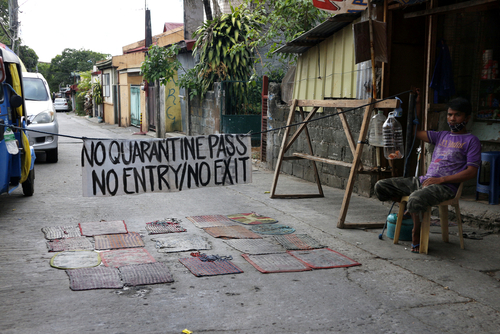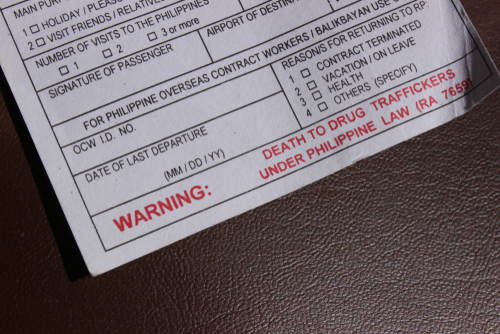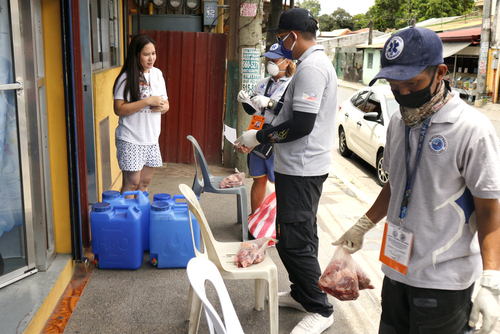COVID-19 and Strongman Rule in the Philippines

Jacques Rupnik’s article on Viktor Orban in Hungary[1] has shown how tempting the opportunity provided by the COVID-19 pandemic has been for autocrats to entrench their rule, especially when they are governing within the context of dysfunctional democracies. In general terms, dealing with the pandemic has seen governments worldwide being given extended emergency powers, thus limiting the power of their legislative and judicial branches of the state, and also, limiting civil liberties, as well as expanding executive control of resources.[2]
Yet, at the same time, responses to the pandemic also reveal the particular characteristics of democratically elected autocratic power and the existence, or not, of the checks and balances required for blocking its descent into rule of a more authoritarian kind. The action of President Rodrigo ‘Digong’ Duterte—aka ‘The Punisher’ or ‘Duterte Harry’[3]—would seem to suggest that in Southeast Asia, as in Central Europe, the pandemic has generated political repercussions of a possibly enduring nature.
Duterte’s Punitive Populism
In order to understand this possible risk for a slide into authoritarian rule engendered by responses to the COVID-19 pandemic in the case of the Philippines, a little background is required.[4] Rodrigo Duterte was elected in June 2016 for a six-year term with a relative majority of 43% of the vote in a one-round election.[5] Since then he has achieved levels of popularity unobtainable by his predecessors since the end of the Marcos dictatorship in 1986. The latest poll by the most reliable Filipino opinion survey company, Social Weather Stations, gave him an overall approval rating of close to 75%.[6] Duterte likes to call himself “the Mayor’” of the Philippines, based on his over twenty years as mayor of Davao in Mindanao. In his vulgar, misogynist rhetoric he demonstrates that he both speaks the language of the people and that he despises the codes of the respectable elites in the Philippines capital Manila. In previous research I have categorized his autocratic style and practice as “punitive populism,”[7] that is an appeal, both to vigilante type justice and, also, to immediate gratification in seeing it conducted expeditiously. This is possible in the context of dysfunctional judicial and penal systems: the country is desperately short of competent magistrates and suspected criminals languish without ever being judged in prisons that are overcrowded to some 450% of their capacity.[8] His ‘War on Drugs’ which has cost some 5,500 lives according to the police—and up to 27,000 according to other sources—remains very popular[9] despite accusations of genocide.[10]

"Death to Drug Traffickers under Philippine Law". Philippines customs document. Copyright: Shutterstock
In the world before COVID-19 Duterte faced little opposition, having imprisoned or side-lined his main opponents leaving only his vice-president, Leni Robredo, elected separately under a system unique to the Philippines, as the figurehead leader of the opposition. Yet this image of an uncontested strongman is somewhat misleading. For example, while the mid-term Senate elections of June 2019 were seen as a success for Duterte, these results need to be nuanced. For example, only four of the 24 senators are clearly in the opposition, of the 20 ostensibly pro-Duterte senators only six can be seen as unconditional supporters. Given the lack of party discipline and the highly opportunist/transactional nature of Philippines politics, for the other 14 their tactical electoral alliance with him for the election has served its purpose. Furthermore, at least three of these 14 have presidential ambitions for 2022 and no interest in perpetuating Duterte’s term in office. The fragile nature of legislative support for Duterte was demonstrated when the House of Representatives in which in theory he has an overwhelming majority—and that is led by ostensible political ally Gloria Macapagal Arroyo[11]—in early December 2018 voted measures to eliminate term limits for themselves, while prohibiting Duterte from running again under a putative new constitution. They also maintained the vice-president—leader of the opposition—as the next in line should a president, die, be impeached or resign. Moreover, both the two other sources of moral and coercive power in the Philippines, the Catholic Church and the Military, are either somewhat hostile in the case of the former and neutral, or rather protective of their institutional interests in the case of the latter.
Duterte Faced with the Pandemic
Initially Duterte declared “everything is well… (since) it will die on its own,” later going on to exhort the people “not to be hysterical… have faith in humanity… (we) are a resilient people,” till admitting in March 2020 that if things deteriorate, “I may have to call on China to help.” Taking no heed of the timely measures undertaken in neighbouring Taiwan and Vietnam, in January 2020, concerned with the political and diplomatic repercussions, there were no travel restrictions placed on mainland China, and there was no banning of flights from Wuhan. Only in mid-March were “enhanced community quarantine” restrictions implemented with the lockdown of the main island of Luzon and much resented travel bans introduced between the islands of the archipelago. On 23 March the two houses of the Philippines Congress in a special session granted Duterte access to 5 billion US dollars of existing funding to provide subsidies. These included helping 18 million impoverished households who could receive assistance of $100-$160 per month.[12] He was also given power to take control of privately-owned hospitals and other health facilities and to take over uncooperative companies. The moves were approved by the business groups, on the proviso that hotels and telecoms companies would be excluded.[13] On 1 April in an impromptu national address Duterte declared, “My orders to the police and military… if there is trouble or the situation arises where your life is on the line, shoot them dead… Understand? Dead. I’ll send you to the grave. Don’t test the government”. He threatened that martial law could be imposed, a threat to be taken seriously given that the Inter-Agency Task Force against Covid-19 includes at least seven former army chiefs.[14] Additionally, on 2 April the Philippines Overseas and Employment Administration imposed a temporary ban on Philippines medical personnel from leaving to work abroad.[15]
Resorting to his default punitive posture, after protests over access to food and medicine occurred, his order to the police to “shoot to kill” against “anyone causing commotion” or “spreading misinformation” was seen as an attack on all his critics, especially those in the media. This fear was given substance when, on 5 May 2020 the National Telecommunications Commission (NTC) ordered the second major media group in the country, ABS-CBN, to cease broadcasting on the grounds that its broadcasting license granted by the Philippines Congress had expired. [16] Duterte had long sought to close this media group controlled by the powerful Lopez family, which had continued to expose the carnage of his War on Drugs. Moreover, he has a longstanding antipathy toward journalists, especially female ones,[17] declaring that many journalists who had been murdered in the Philippines over the previous decade or so “deserved to die.” Once elected, Duterte warned that “freedom of information will not protect journalists (…) from assassination.”[18]
Duterte’s Contradictions
The pro-active aspect of Duterte’s response to the coronavirus pandemic — subsidies to the poorest households—has been something of a failure. The poor families targeted claim that they are not receiving these funds and, anyway, that they barely cover a week of household expenses,[19] while there has been a middle-class reaction to this being left out.[20] Yet, what is foremost in alarming public opinion, are the predominately coercive aspects in Duterte’s action.
There are contradictions in resorting to Duterte’s default “punitive populist” agenda in response to the pandemic. COVID-19, as the new enemy of his people, cannot be eliminated through extra-judicial killing nor other forms of repression. Moreover, unlike the drug dealers in Duterte’s war on drugs, the communists of the New People’s Army and the Islamic State-affiliated terrorists in southern Mindanao, the victims of the pandemic cannot be portrayed as somehow deserving of their fate. Even Duterte would not go so far as to say the oligarchs of the Manila elite—who are also the target of his populist rhetoric—deserve to die. In fact, in the midst of the pandemic he issued an apology, the only one that has been recorded so far, to two of the most important oligarchic families, the Zobel de Ayala and Pangilinian, for having called into question the contribution of their major conglomerates to the economic consequences of the pandemic, and of threatening to jail them.[21] This is an admission of the weaknesses of public finances with tax receipts below 15% of GDP. Without the public financial means to deal with the sanitary, social and economic consequences of the pandemic, Duterte’s strongman posturing can be seen for what it is, an admission of helplessness.

Government workers give out relief goods during COVID-19 outbreak, Philippines. Copyright: Shutterstock
The population that is seeing its lives and livelihoods most threatened are his political support base. These include the almost 75% of workers in the informal sector[22]; the families of the heroes of the Philippines Republic, the Overseas Philippine Workers (OFWs) or Filipino diaspora, who contribute almost 10% of GDP;[23] and the aspiring lower middle class typified by the 1.3 million Filipinos who work in call centres, and who are exonerated from the lockdown. The impact of Duterte’s “Enhanced Community Quarantine” is most brutal in the slums of Manila given his order to the Police to “shoot to kill anyone who is not respecting his confinement or is “spreading misinformation.” A killing by the police of a mentally-disturbed ex-soldier and of a drunk farmer who refused to wear a facemask, illustrated for many the arbitrary nature of Duterte’s injunctions. In a country which holds the world record for the use of the internet social media—an average of four hours a day—online rage at the incompetence of the Duterte Administration is drowning out his own propaganda machine and his team of trolls.[24]
As it could be argued, as with Jair Bolsanaro in Brazil, macho-type posturing is seen as rather pitiful response to a life-threatening pandemic.[25] Given this situation, Duterte requires a scapegoat and the obvious one, as for Donald Trump, is China. However here he has a problem. Abetted by his instinctive anti-Americanism, he has embarked on a rapprochement with China since his election, downgrading the alliance with the United States, and seeking Chinese investment for his “Build, Build, Build” infrastructure projects aimed at reducing poverty, encouraging economic growth and reducing congestion in the capital city Manila.
As mentioned, by being conciliatory towards Beijing in January and February 2020, Duterte allowed the pandemic to propagate. In return there have been no benefits.[26] On the contrary, increasingly aggressive Chinese behaviour in the South China / Philippine Sea in April 2020 over areas in which both countries claim territorial rights has further discredited his pro-Chinese stance. In such a geopolitical context, Beijing’s rather unsubtle public diplomacy in providing surgical masks and other medical equipment to the Philippines has proved to be counter-productive.[27] Yet, because of his pro-Chinese posture, Duterte, unlike Donald Trump, is not in a position to promote a conspiracy theory blaming China for the sanitary disaster ravaging his people.
Thus, at this point in time, it would not be unreasonable to declare that the “emperor is naked.” His bombastic comments are not quite the empathetic response sought by his “people.” As in the U.S. a little frank expertise from medical practitioners would seem to be more the response the population is seeking. Moreover, he is already a lame duck president with both the opposition and his allies in the Philippines Congress putting brakes on his authoritarian tendencies and positioning themselves for the 2022 presidential elections. His ambition to perpetuate his own dynasty and have his daughter Sara, who succeeded him as mayor of Davao, become president in 2022 is by no means inevitable. But then again in Philippine politics, like with the coronavirus, the only certainty is uncertainty.
Access the other articles published on COVID-19 on the CERI website, in French and in English
Access the CERI's Resources on the pandemic here.
Access the CERI's Resources on Populism here.
Access the CERI's Resources on China here.
[1] "Viktor Orban et l’Europe centrale face au covid-19," 17 April 2020, available at, /ceri/fr/content/viktor-orban-et-l-europe-centrale-face-au-covid-19
[3] This is an allusion to the Hollywood film, Dirty Harry in which Clint Eastwood plays the part of a policeman oblivious to legal niceties and ever ready to carry out summary justice himself.
[4] On Duterte’s career prior to his election and his first year in office see Curato, Nicole (ed.), A Duterte Reader: Critical Essays on Duterte’s Early Presidency , Quezon City: Ateneo de Manila University Press, 2017; Heydarian, Richard, The Rise of Duterte: A Populist Revolt against Elite Democracy, Basingstoke UK: Palgrave Macmillan, 2018; Miller, Jonathan, Duterte Harry: Fire and Fury in the Philippines, Melbourne/London: Scribe, 2018.
[5] According to the 1987 Constitution he is limited to one term and cannot run again in 2022. Teehankee, Julio & Thompson, Mark, “Electing a Strongman,” Journal of Democracy 27(4) 2016, p. 126.
[7] Camroux, David, « Le populisme punitif aux Philippines » in Alain Dieckhoff, Christophe Jaffrelot & Elise Massicard (eds)Populismes au Pouvoir, Paris: Presses de Sciences Po, 2019, pp. 141-154.
[8] World Prison Brief referenced in Nikkei Asian Review 21 April 2020. One of the clusters of the coronavirus pandemic is in the New Bilibid Prison in Greater Manila (Rappler 30 April 2020).
[9] Social Weather Stations, Fourth Quarter 2019 Social Weather Survey: Pres. Duterte’s Net Satisfaction rating rises to “Very Good” +60%, SWS, 28th December 2019 (accessed at: https://www.sws.org.ph/swsmain/artcldisppage/?artcsyscode=ART-2018122812... ).
[10] Simangan, Dahlia, “Is the Philippine ‘War on Drugs’ an Act of Genocide?” Journal of Genocide Research 20(1) 2018, pp. 68-89.
[11] Arroyo was president from 2001 till 2010, after which she was imprisoned in a military hospital on accusations of electoral fraud. Duterte had her released from prison, found not guilty, and she was allowed to return to politics.
[13] Venzon, Cliff, “Duterte granted $5bn and power over companies to fight coronavirus,” Nikkei Asian Review, 24 March 2020.
[14] Robles, Raissa, “Coronavirus: is Covid-19 task force Duterte’s ‘Rolex 12’ in plan for Marcos-style martial law in the Philippines?” South China Morning Post, 28 April 2020.
[15] Philippines health workers are in even great demand internationally because of the COVID-19 pandemic. Some 13,000 go abroad each year joining over 100,000 already working essentially in the United States, Europe and Singapore. At the same time there is a shortage of 290,000 health care workers in the Philippines itself.
[16] At the time of writing there is a judicial procedure before the Supreme Court. Moreover, as evidence of the relatively weak legislative support Duterte receives alluded to previously, on 11 May 2020 the Senate voted 16 for with 8 abstentions asking the NTC to reconsider its decision and two days later the House of Representatives was poised to vote to extend the broadcasting license till October 2020.
[17] Go, Miriam (2019) “Sexism is president’s power tool: Duterte is using violent language and threats against journalists,” Index on Censorship 48(4), pp. 33-35.
[18] Beltran, Jermaine ,“The Emergence of the Philippine ‘Anti-Media’: The Duterte Factor”, Jurnal Ilmu Kumunikasi 14(1) (2017), pp. 61-74. Accessed at https://ojs.uajy.ac.id/index.php/jik/article/view/833/984
[19] Abad, Michele, “Poor families still await subsidies during coronavirus lockdown,” Rappler, 21 April 2020.
[20] Venzon, Cliff, “Duterte’s cash aid for poor Filipinos draws middle class pushback,” Nikkei Asian Review, 17 April 2020.
[21] Venzon, Cliff “Duterte apologized to Philippine tycoons he threatened to jail,” Nikkei Asian Review, 5 May 2020.
[23] In 2019 the figure was $30 billion. See Nikkei Asian Review 18 February 2020. With a collapse in the cruise ship industry, massive layoffs in the Middle East and the US and the impact on domestic workers in Italy the amount of remittances is expected to fall dramatically.
[24] Tomacruz, Sophia & Hapal, Don Kevin, “Online outrage drowns out Duterte propaganda machine,” Rappler 24 April 2020.
[25] See Olivier Dabène and Román Perdomo’s paper on the CERI website,
/ceri/en/content/covid-19-latin-america-interview
[26] One keen observer has described a stalemated situation where the Philippines has, neither, developed a new alliance with China, nor, really abandoned its cooperation with the United States. Heydarian, Richard, “Change and continuity in the Philippine-US-China triangle,” East Asia Forum, 11 May 2020.










